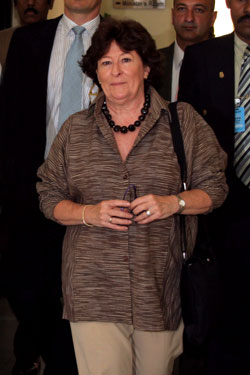Ilankai Tamil Sangam30th Year on the Web Association of Tamils of Sri Lanka in the USA |
||||
 Home Home Archives Archives |
The Tamils Are a 'People'Though a minorityby J. S. Tissainayam, Sunday Times, Colombo, October 21, 2007
The visit of the UN High Commissioner for Human Rights Louise Arbour was preceded by two important events in Sri Lanka. On 24 September, the LTTE issued a statement that coincided with the sessions of the United Nations General Assembly. The statement urged the international community to recognise the concept of the sovereignty of the Tamil people and to give them the opportunity to express their aspirations as in the case of the peoples of Kosovo and East Timor. The Tiger statement also called the government of Sri Lanka to “accept the aspirations of the Tamil people and come forward to find a resolution that is based on the right to self-determination of the Tamil people.” The second event was the UNP announcing the need to amend the CFA and that its new policy towards a political solution to the ethnic problem would be “…based on a credible power sharing proposal acceptable to all communities.” This, in effect, declared the party’s repositioning on power-sharing from what it had agreed to in the Oslo Communiqué, which was “founded on the principle of internal self determination in areas of historical habitation of the Tamil speaking peoples, based on a federal structure within a united Sri Lanka.” The visit of the UN official was in response to human rights violations taking place in Sri Lanka such as, extra-judicial killings, disappearances, abductions, atrocities on IDPs, shortcomings in the freedom of expression etc. Nearly all these violations are closely related to the armed conflict in the country. Arbour made no bones about the fact that the human rights mechanisms in Sri Lanka were so ineffective that an international human rights monitoring mission was required to be present on the ground if rights were to be effectively protected. While the violation of rights that brought Arbour to Sri Lanka was mainly due to the war that had led to the government suspending the usual safeguards available to the citizen, we have to go a step back to see why armed conflict emerged in this country at all. The reason for militant movements to take up arms in the 1970s was because of a systematic and relentless campaign by successive Sri Lankan governments to violate the collective rights of the Tamils – the right to language, to equal opportunity in education, employment and livelihood, to culture and security (among others). The war did not begin because of the LTTE or the other Tamil militant movements; it began because of the abuse of the collective rights of the Tamil people and when attempts at peaceful redress of those violations were unfruitful. It is important to note that what were being violated were the rights of a ‘people.’ According to international law, a group that could be described as a ‘people,’ if they believe that their right to live as equals within the state is being challenged, have a right to self-determination. Are the Tamils a ‘people’? Justice Marcus Enfield speaking at an international conference on Sri Lanka’s ethnic conflict in 1996 said “There appears to be an underlying assumption that ‘peoples,’ in the sense used in international instruments, is the same as ‘the minority,’ and that they have the same rights in international law. A group which may fit within the definition of ‘peoples,’ cannot cease to be such merely because (as) a result of demographic or territorial change it becomes a minority of the population. This has been recognized to be the case for the Tamils by the widely respected International Commissions of Jurists, a representative of which is stated:
The evolution of the right to self-determination becoming part of international law is too long to describe here, but suffice it to say that it was used extensively in the 1950s and 1960s by anti-imperialist movements against colonialism. However, once these new nation states were born, dominant groups within such post-colonial states began pursuing policies of discrimination against vulnerable communities within the state, such as the Tamils in Sri Lanka. The right to self-determination allows a people to adopt a political status so that they may “freely pursue their economic, social and cultural development.” This means they have the right to choose a political organisation within which they can freely express their economic, social, cultural and other aspirations. The basis of the struggle of the Tamil people is the systematic discrimination they have faced, facilitated by power relations prescribed by successive constitutions from the time of independence. They have all been unitary constitutions that placed effective control of political institutions at the centre – the president, parliament and judiciary – that have been traditionally Sinhala dominated. What is more, the passage of these constitutions through parliament was not with the consent of the Tamil people. It is very important to note, however, that the right to self-determination does not necessarily mean secession, though misinformation by vested interests has portrayed it as such. Internal self-determination (which was an element in the Oslo communiqué) refers to structures of autonomy within a state. Only external self-determination signifies secession or a separate state. Arbour and the international community have been absolutely forthright in condemning human rights violations that circumscribe the freedom of the individual. That is because for historical and pragmatic reasons she and all her tribe from the west lay greater emphasis on individual human rights. But if the international community is sincere about evolving a rights-based solution to the national question in Sri Lanka, doing patch-up work on individual human rights violations will not do. Violations of the collective rights of the Tamils and Muslims are the basis of the conflict, and long-term, sustainable solutions will not be possible unless they are addressed. |
|||
|
||||
